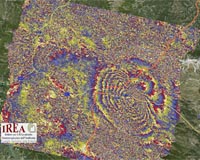| . |  |
. |
Nantou, Taiwan (AFP) Sept 20, 2009 Crumpled temples and buckled running tracks are among the scattered visible scars left from the earthquake that devastated Taiwan a decade ago on Monday. And the emotional aftershocks from the 7.6-magnitude tremor that killed 2,415 people are still being felt today. "Two of my granddaughters were crushed to death in the quake," said Lin Yu-bi, an 82-year-old woman from Guoshing township in Nantou county, near the epicentre in central Taiwan. "I think of them every day, and my heart aches." Her voice almost failing her, she described how in the minutes after the quake struck at 1:47am she struggled desperately to pull herself from the rubble that was her home -- only to be faced with an apocalyptic vision when she finally emerged into the open. "Outside everything was flattened. It was horrifying. It was almost supernatural and there was nothing we could do about it," she said. Tseng Yu-ching, a nurse who worked at a health station in Nantou ten years ago, saw 100 bodies laid out in neat rows in the town square. "Even though I am a nurse, I never thought that I would see so many bodies at one time. Some were people I knew or worked with," said Tseng, now 45. For three days she was so scared of going indoors that she avoided taking a shower. "It felt like the end of the world, because I didn't know what could happen next. Every day I cried as I heard news of more people I knew who had been found dead. Now when I think back I just feel so lucky to be alive," she said. Many buildings, such as the crumpled Wuchang temple, have been preserved in the state they were left in immediately after the quake, as a reminder of nature's raw power over man. The quake in 1999 was the second-deadliest in Taiwan's history, after a 1935 quake that cost the lives of more than 3,000. "The quake was so devastating because it ran through a rather densely populated area, home to hundreds of thousands of people," said Wu Yih-min, a leading quake expert at the National Taiwan University. But for all the physical devastation, the quake also united Taiwan like few other past events, with help flowing to the disaster zone from less affected parts of the island. "The earthquake bonded Taiwan and created a sense of crisis among the people who realised that they were in the same boat and they had to stand united," said Lee Shiao-feng, a historian at National Taipei University of Education. China's role in the rescue efforts -- including a refusal to let a Russian relief plane cross its air space -- alienated large parts of the island's population, according to observers. It may even have helped pro-independence politician Chen Shui-bian win the presidential election the following year, marking the start of a chill in relations that only ended after he stepped down last year. "China's interference in international rescue efforts also strengthened an independent Taiwanese consciousness that eventually helped Chen Shui-bian to win the presidential election the following year," said Lee. "I think Beijing probably learned a lesson from the last time and was more cautious in its response to Typhoon Morakot in August, apparently to avoid stirring up a similar adverse reaction from the Taiwanese public." Taiwan also learned a lesson and has enforced stricter regulations on quake-safe construction over the past decade. It has also trained rescue teams and was even able to provide assistance to China after the devastating Sichuan quake last year. But another lesson is that no matter the money and time spent, complacency is not an option. "As scientists, we should never say 'we're ready' because earthquakes may cause any type of damage that will catch us unprepared," said Wu, the quake expert. Share This Article With Planet Earth
Related Links Bringing Order To A World Of Disasters A world of storm and tempest When the Earth Quakes
 Italy PM hands over first new homes to quake survivors
Italy PM hands over first new homes to quake survivorsOnna, Italy (AFP) Sept 15, 2009 Italian Prime Minister Silvio Berlusconi on Tuesday handed over the keys of the first permanent houses for those left homeless by a devastating earthquake that killed hundreds of people. More than five months after the massive quake rocked the central Abruzzo region, Berlusconi arrived with great fanfare in the shattered village of Onna, outside the main town of L'Aquila, to deliver 94 new ... read more |
|
| The content herein, unless otherwise known to be public domain, are Copyright 1995-2009 - SpaceDaily. AFP and UPI Wire Stories are copyright Agence France-Presse and United Press International. ESA Portal Reports are copyright European Space Agency. All NASA sourced material is public domain. Additional copyrights may apply in whole or part to other bona fide parties. Advertising does not imply endorsement,agreement or approval of any opinions, statements or information provided by SpaceDaily on any Web page published or hosted by SpaceDaily. Privacy Statement |